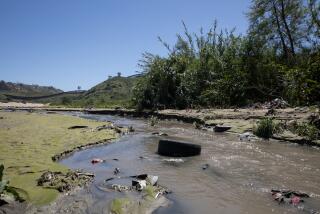CALABASAS : Compost From Recycled Sewage to Be Offered
- Share via
It’s nothing to sniff at: Within months, residents of the Las Virgenes area will be offered free compost made from the effluent of their own toilets.
Las Virgenes Municipal Water District officials say their new, $50-million compost plant will be rid of the foul smell of sewer sludge and suitable for use on their customers’ flower and vegetable gardens.
“It’s not set how it will happen,” said district spokeswoman Bobbe Wymer. “But the district is committed to the idea of offering free compost to our customers who, you might say, have a personal investment in it.”
The district already purifies waste water from the 20,000 homes it serves and uses most of it for irrigation. But with the start-up of the Rancho Las Virgenes Composting Facility later this month, the small water agency will become one of the world’s first to recycle nearly all the water and solids from the sewage it collects.
Only about half a dozen agencies in the United States use such sophisticated indoor compost facilities. The city of Los Angeles sends most of its sewer sludge to farmland in Arizona and a simple outdoor compost facility in the San Joaquin Valley, but lets most treated waste water flow into the Pacific Ocean.
In a way, the Las Virgenes compost facility works like a digestive system in reverse.
At the upper end of the hillside plant, sewer solids flow from the Tapia Water Reclamation Facility through a two-mile pipe. The sludge will be kept in tanks for two months, while microscopic bugs feed on the harmful bacteria.
Then, the ooze will be spun dry and pushed through a series of conveyor belts to another building, where it will be mixed with sawdust and baked for another month. The entire facility is enclosed, to prevent odors from escaping.
“It kind of resembles what goes on inside the human body,” said reclamation Supervisor Steve Witbeck. “Except that the product is somewhat nicer.”
Some people may turn up their noses at the idea of shoveling cured human waste into their prize gardens. But the loamy stuff is valuable fertilizer, and a commercial company already has offered to provide sawdust in exchange for most of the compost produced at Las Virgenes.
The facility enables the district to avoid injecting sludge into its nearly saturated farm soil, as it does now, or paying a landfill to accept the solid waste, as do many districts. But officials concede that the plant will be no money maker.
“We justify it in ecological terms,” Wymer said. “We take a lot of pride in the total beneficial reuse of resources.”
Pride, along with a few snickers about the origin of the compost.
A visitor to Rancho Las Virgenes might see workers wearing shirts stenciled with “We’re number 1 in the number 2 business” and probably would hear, at least once, a favorite slogan: “Compost happens.”
“You have to have a sense of humor about it,” Wymer said. “Look at what we’re dealing with.”
More to Read
Sign up for Essential California
The most important California stories and recommendations in your inbox every morning.
You may occasionally receive promotional content from the Los Angeles Times.










